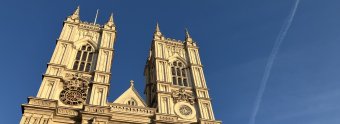The UK is one of the last western democracies with a state religion: the Church of England.
The Church's entanglement with the state is bad for both.
Join our campaign to disestablish the Church.
CAMPAIGN ALERT: Support the disestablishment bill
In November 2023, a private member's bill to disestablish the Church of England was selected in the ballot.
Please write to your MP and urge them to support this bill, to make the UK are more equitable and democratic country for people of all religions and beliefs.
Since our founding in 1866, one of our primary objectives has been disestablishment of the Church of England: its formal separation from the state.
More than 150 years later, census figures show most people in England and Wales are not Christian. Surveys consistently reveal a similar picture in Scotland. The case for disestablishment has never been stronger.
Disestablishment means the Church would no longer have privileged input into government - but also that government could not involve itself in the running of the Church. Both sides would gain autonomy. This is why support for Church-state separation can be found within the CofE itself.
There have been many proponents, religious and non-religious, for church-state separation, and there are a wide variety of motivations for supporting this reform.
The existence of a legally-enshrined national religion privileges one part of the population, one institution and one set of beliefs. Removing all symbolic and institutional ties between government and religion is the only way to ensure equal treatment to citizens of all religions and none.
The Church of England has enjoyed significant privileges relating its established status for many centuries. These privileges have remained largely unchanged despite the massive and continuing reduction in support for the Church in the UK. It is highly likely that this trend will continue for the foreseeable future, making the Church of England's continuation as the established church unsustainable.
- Christians are a minority in Britain. In Wales and Scotland the majority have no religion.
- Just 1% of 18-24 year olds say they belong to the Church of England.
- Less than 1% of the population regularly attend Church of England church services.
The Church of England is also out of step with the UK public on several key issues: it remains opposed to same-sex relationships and allows parishes to reject women as bishops and priests. These discriminatory positions cannot be reconciled with the Church's status as part of the UK state.
And no institution with the shameful historical record of the Church of England safeguarding and abuse should retain its privileged role in the British establishment.
The existence of a legally enshrined national religion privileges one part of the population, one institution and one set of beliefs. Removing all symbolic and institutional ties between government and religion is the only way to ensure equal treatment of citizens of all religions and none.
Take action!
1. Write to your MP
Ask your MP to support the separation of church and state
2. Share your story
Tell us why you support this campaign, and how you are personally affected by the issue. You can also let us know if you would like assistance with a particular issue.
3. Join the National Secular Society
Become a member of the National Secular Society today! Together, we can separate religion and state for greater freedom and fairness.
Latest updates
Solicitor struck off for conflict of interests in defending bishop
Posted: Mon, 9 Jan 2023 15:39
A legal advisor who delayed bishop Peter Ball's imprisonment for abuse has been struck off, following complaints raised by the National Secular Society.
Christopher Peak, the former legal advisor to the Church of England Diocese of Gloucester, agreed to remove himself from the roll of solicitors by the Solicitors Regulation Authority (SRA), according to a decision published today.
In 1992 Peak became the personal solicitor to Ball (pictured), then the bishop of Gloucester, to defend him against multiple allegations of sexual misconduct involving congregants, some of whom included minors and vulnerable adults.
Ball admitted to Peak that he had committed offences of indecent assault and gross indecency against parishioners.
The SRA found Peak had "wilfully or recklessly disregarded the risk of harm" by agreeing to defend Ball while also acting as the registrar and legal advisor for the diocese.
This therefore caused a conflict of interest between his duty to protect the interests of the diocese's congregation, and Ball's desire to receive "as lenient an outcome as possible" for his offences and return to his ministry.
Peak's defence leads to delay in conviction
Following Ball's arrest in 1992, Peak successfully encouraged the Crown Prosecution Service to issue him with a caution rather than prosecute him. Although Ball subsequently resigned, the Church took no disciplinary action and Ball was not placed on the church's list of clergy about whom there were concerns.
Instead, Ball was permitted to carry out services within the Church, including working with children.
Ball was not convicted until 2015, after new evidence of his abuse of boys and young men emerged. He was sentenced to 32 months in prison.
During the two decades in which Ball evaded prison, the abuse suffered by his victims was compounded by the Church's unwillingness to act, leading them to expect Ball would never face justice. Victim Neil Todd committed suicide after several attempts starting in 1992.
The Church's report concluded in 2017 that its actions were "likely to have led people in the Church to believe that Ball was essentially innocent", when Peak at least knew he was not.
Ball also used his friendships with senior establishment figures, including then-Prince Charles, to evade justice.
Charles told Ball in a letter in 1995, two years after the bishop had accepted the police caution: "I wish I could do more. I feel so desperately strongly about the monstrous wrongs that have been done to you and the way you have been treated."
NSS welcomes SRA decision
Between 2015 and 2018 concerns over Peak's role were raised by the Independent Inquiry into Child Sex Abuse and the NSS.
NSS president Keith Porteous Wood said: "We welcome the SRA's response to our concerns. The clear conflict of interest led to an unacceptable delay in Ball's conviction, putting children at risk and adding to the anguish of his victims. Peak should never have put the bishop's interests above justice for the victims and the safety of his congregation.
"Sadly, there are indications that the Church has failed to learn from this incident. IICSA has repeatedly found cases of the CofE protecting its own reputation above the wellbeing of children and other vulnerable people.
"The role of the Church's privileges, including its close relationships with the establishment, in its failings on sex abuse within its ranks must be scrutinised."
NSS vice president and lawyer for many of Peter Ball's victims, Richard Scorer, said: "This case demonstrates yet again that the Church of England has been rife with conflicts of interest particularly when it comes to dealing with cases of clerical abuse. In this case the interests of a senior Bishop under investigation for abuse was treated as being the same as the interests of the church as a whole.
"Cases like this show yet again that the Church of England cannot be trusted to deal fairly and objectively with abuse allegations in house and only proper independent oversight and mandatory reporting will ensure that this happens. We need these urgently."
Census England & Wales: Less than half the population Christian
Posted: Tue, 29 Nov 2022 10:06
The National Secular Society has called for separation of Church and state after census data revealed that less than half the population are Christian for the first time.
According to data from the 2021 Census released today, 46% of people in England and Wales described themselves as "Christian".
This is a 13 percentage point decrease from 59% in 2011.
Meanwhile, the percentage of people who said they have no religion surged to 37%. In 2011, this figure was 25%.
Members of minority religions including Islam and Hinduism have seen a steady increase.
Wales had a greater decrease in people reporting their religion as "Christian" (from 58% in 2011 to 44% in 2021) and increase in "No religion" (from 32% in 2011 to 47% in 2021) compared with England and Wales overall. This makes the nonreligious the largest religion or belief group in Wales.
In Northern Ireland, those without a stated religion are the second largest group, according to its Census results published in September.
Scotland's 2022 Census data has not yet been published. 2018 survey data found 59% of Scots are non-religious.
NSS: Established church "absurd and unsustainable"
The NSS, which campaigns for separation of religion and state, said the figures demonstrate a need for "fundamental reforms" to the relationship between religion and state.
The UK has a state religion, the Church of England, which is granted unique privileges including 26 places in the House of Lords reserved for its bishops. The head of state, the British monarch, is also Supreme Governor of the Church of England and takes an oath to promote the Church.
One third of state schools in Britain are faith schools, and all state schools must by law hold daily acts of Christian collective worship.
NSS chief executive Stephen Evans said: "It's official – we are no longer a Christian country.
"The Census figures paint a picture of a population that has dramatically moved away from Christianity – and from religion as a whole.
"The current status quo, in which the Church of England is deeply embedded in the UK constitution, is unfair and undemocratic – and looking increasingly absurd and unsustainable.
"We need fundamental reforms to become a true secular democracy – one that reflects the reality of our irreligious and diverse people and is fit for the 21st century."





